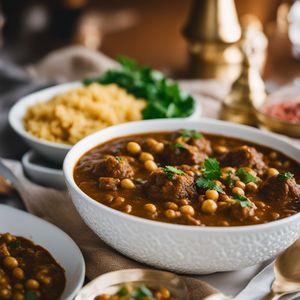
Dish
Limbă cu măsline
Romanian Beef Tongue with Olives
The dish is made by simmering beef tongue in water with vegetables and herbs until tender. The tongue is then sliced and sautéed with onions and garlic. Olives and tomato sauce are then added to the pan and simmered until thickened. The dish is typically served with a side of polenta or boiled potatoes.
Origins and history
Limbă cu măsline is a traditional Romanian dish that has been enjoyed for centuries. Beef tongue was a common ingredient in Romanian cuisine, and this dish was often served at special occasions such as weddings and holidays.
Dietary considerations
This dish is not suitable for vegetarians or vegans as it contains beef tongue. It is also not suitable for those with gluten intolerance as it is typically served with polenta or bread.
Variations
There are many variations of Limbă cu măsline, with some recipes calling for the addition of other vegetables such as mushrooms or bell peppers. Some recipes also call for the addition of herbs such as thyme or oregano. Some variations also use different types of olives such as Kalamata or green olives instead of black olives.
Presentation and garnishing
Limbă cu măsline is typically served on a platter with the sliced beef tongue and olives arranged on top of the sauce. It is often garnished with chopped parsley or oregano.
Tips & Tricks
To make the dish even more flavorful, you can add herbs such as thyme or oregano to the sauce. You can also experiment with different types of olives such as Kalamata or green olives. To save time, you can use canned tomato sauce instead of making it from scratch.
Side-dishes
Limbă cu măsline is typically served with a side of polenta or boiled potatoes. Some people also like to serve it with a side of sautéed greens such as spinach or kale.
Drink pairings
Limbă cu măsline pairs well with a variety of Romanian wines such as Fetească Neagră or Merlot. It also pairs well with red wines such as Syrah or Cabernet Sauvignon.
Delicious Limbă cu măsline recipes
More dishes from this category... Browse all »

Aab gosht
Indian cuisine

Abgoosht
Iranian cuisine

Adobo
Filipino cuisine

Adobo sa gatâ
Filipino cuisine

Adobong baboy
Filipino cuisine

Adobong baka
Filipino cuisine

Adobong dilaw
Filipino cuisine

Adobong hito
Filipino cuisine
More cuisines from this region...

Belarusian cuisine
Hearty, Filling, Savory, Rich, Flavorful

Bulgarian cuisine
Hearty, Filling, Savory, Rich, Flavorful

Moldovan cuisine
Hearty, Savory, Flavorful, Spicy, Tangy

Romani cuisine
Bold, Spicy, Flavorful, Tangy

Russian cuisine
Hearty, Savory, Flavorful, Spicy, Tangy

Ukrainian cuisine
Hearty, Savory, Rich, Creamy, Earthy

